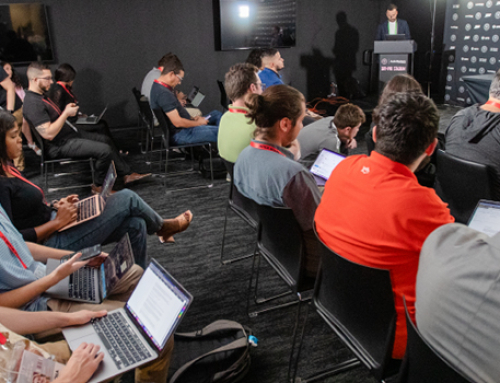By: Media Management Association
This summary statement was a fitting conclusion for the presentation of Revolt Media & TV’s James Brown to the members of the Media Management Association on Tuesday, March 3. Brown, currently the EVP of Content Distribution at this content creation company, explained his professional journey from Bell Atlantic to ESPN to Revolt and offered advice to students interested in working in the content distribution business.
While working at Bell Atlantic in the 1980s and 1990s, Brown remembered being a part of a select group of managers entrusted with the task of determining who could take business away from his company. As such, Bell Atlantic (now Verizon) reasoned that it should “attack” competitors before they could “attack” it. This strategy led to the creation of Fios.
Moving from the relative safety of a large firm with 100,000 employees to ESPN with a mere 700 employees in the mid-1990s took some soul-searching, but Brown decided that it was worth the risk to learn all the facets of the distribution and programming processes. During that time, he negotiated six-year-long deals between multichannel video programming distributors (MVPDs), like cable operators, and ESPN. Early on, the carriage fee paid by an MVPD was only 50 cents.
Revolt Media & TV brought back Brown from retirement in 2014. He was intrigued by this start-up, but vouched to stay only two years on the job. Revolt defies any easy definitional categorization because it has assets in television (Revolt TV, which delivers Hip Hop and R&B musical and cultural programming to traditional and virtual MVPD platforms), in content (Revolt Films, which produces television programs and feature films), and other media. Branding itself as a content creator, Revolt encourages diversity of thought and music among its employees.
With more than 30 years of professional experience, Brown did not sugarcoat the challenge of entering the content distribution business.
“Distribution might be the toughest job in the media business,” he said.
It takes time to make deals and value content. He noted that worldwide competition can be fierce for young people on the job market. Brown urged students to be original (e.g., use of a video resume), to intern, and to establish relationships with their peers and the alumni network. In the social media era, Brown felt that smartphones have not hurt the interpersonal communication skills of Revolt’s young employees. He admitted, though, that their written communication, at times, needed some professional “assistance.”






